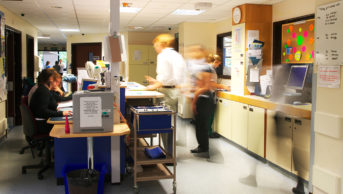
Shutterstock.com
In 2011, a nurse in Seattle, Washington, with 27 years’ experience, took her own life a few months after making a calculation error that led to an overdose of calcium chloride causing the death of a critically ill infant. In this case, once the error was spotted, the nurse was immediately escorted off the premises and later lost her job.
And in December 2014, the General Medical Council (GMC) in the UK published a report after an internal review, which was commissioned after 28 doctors committed suicide between 2005 and 2013 while under GMC fitness-to-practise investigations.
Patricia Edwards, lead education and training pharmacist at Luton and Dunstable University Hospital, conducted a study to evaluate the extent to which pharmacy staff, doctors, and nurses are supported in their learning from medication errors. Participants revealed that after making medicines errors they felt a range of emotions, which led to loss of sleep, nausea and episodes of crying. And while participants reported a loss of confidence in performing the same task, there was a lack of support to help them rebuild that confidence.
When an error occurs, our primary concern is for the welfare of the patient, but this often means the health professional is left behind contemplating the consequences and dealing with the emotional distress as well as the professional and personal implications.
Fatal and harmful errors can stay with health professionals for the rest of their lives[1]
, so what should pharmacists do if they make an error, and what support is available to them?
Saying sorry
Community pharmacist Tony Schofield stresses that how an individual handles an error is paramount. “If they do nothing, the chances are that something bad will come out of it,” he says. “If they admit the error immediately when they are aware of their involvement, and seek to minimise the impact on the patient, while informing everyone involved (for example, the prescriber), they will emerge from the event with little to worry about.”
James Andrews, lead pharmacist at Virgin Care, describes his first error in practice as “a crushing experience”. He says he felt “a real mix of emotions: disbelief (how could I make a mistake, I’m always so careful?), worry (about the patient, but also selfishly about myself and the impact it would have on my reputation and role), shame, uncertainty on how to manage it and what to do next.”
When an error is made, the patient should be informed immediately. Has the patient taken the wrong medicine? Have they been harmed? Once the error has been confirmed, the patient should receive an apology (which should not be confused with an admission of liability). Andrews explains: “Firstly, I apologised to the patient. I’d failed them and I wanted them to know I was sorry about this. Being empathetic is an important part of being a pharmacist and this is a perfect chance to use that.”
The patient should then be supplied with the correct medicine and given the contact details of the fitness-to-practise department of the General Pharmaceutical Council (GPhC) in case he or she may wants to make a complaint. Regardless of harm, the GPhC recommends that the pharmacist contacts the patient’s GP. Additionally, the error should be reported to line managers, if required, and the relevant professional indemnity insurers. A record of the error should be made, including all the details required by the pharmacy standard operating procedure.
Since 2005, pharmacists in England have been required to report errors to the National Reporting and Learning Service (NRLS). The GPhC advice document ‘Responding to complaints and concerns’ provides a step-by-step guide to handling errors and explains that the way each case should be handled depends on the severity of the incident.
Panic and guilt
Individual responses to errors can range from common uncomplicated stressful reactions to post-traumatic stress disorder, and this usually depends on the severity of the error. However, minor incidents and near misses can also cause traumatic stress[2]
.
Schofield recalls his first error in practice: “Penbritin (ampicillin) had been dispensed instead of penicillin v 250mg. When I realised, my first recollection is of great panic followed by shame and crushing self-doubt. It wasn’t a life-threatening issue but I had qualified and registered the previous week and knew my performance was being scrutinised. I was also aware that it could have been more serious and for some reason I behaved as if I’d killed someone.”
He also highlights the specific pressures experienced by pharmacists. “I once made an error and was trying to sort it out when two of my GP friends arrived as we were supposed to be going out,” he says. “Both of them were aghast at my concern until one pointed out that they had a safety net (pharmacy) and we don’t.”
Getting the right support
In order to overcome negative feelings and emotional turmoil, confidential and compassionate support is required. Support groups, one-to-one counselling and talking to peers can help fill the support void that often follows an error[3]
.
Fortunately, both Andrews and Schofield felt they had someone with whom they could discuss the incident. However, Schofield elaborates: “Support is a commonly used word these days. I’m not sure there was any. I knew that Boots indemnity would protect me from civil action but that I was vulnerable if a… complaint was made to [the then] Royal Pharmaceutical Society of Great Britain.”
Nowadays, the Royal Pharmaceutical Society members’ support team can provide confidential, practical advice and support on what steps pharmacists should take when they have been involved in an error. Although they do not offer counselling directly, when appropriate they direct pharmacists to Pharmacist Support — an independent registered charity that provides help and support to pharmacists.
According to the charity, the thought of making an error is a major stress for pharmacists and trainees — one of the worries is the impact of potential errors on their careers. This is despite the fact that the GPhC does not consider single dispensing errors, where no aggravating factors exist, to be a fitness-to-practise matter.
Pharmacist Support’s marketing manager Kate Westbrook explains that the charity offers a range of free and confidential support services to assist pharmacists through stressful situations: “The Listening Friends helpline is staffed by trained volunteers who are all working or retired pharmacists,” she says. “Callers can talk anonymously and in confidence about a range of issues such as workplace stress, health issues, financial worries or anxiety, for example.
“The Wardley well-being service is delivered through workshops, webinars, fact sheets and an e-therapy package and provides information to help people recognise the signs of stress, and equips them with tools and techniques to help them deal with feelings of pressure. The e-therapy programmes are based on cognitive behavioural therapy and include practical exercises and interactive features.
 These resources can help pharmacists cope with the negative thoughts and feelings that can occur after stressful events such as an error.”
Pharmacist Support can also arrange access to a specialist employment adviser at the Manchester Citizens Advice Bureau, which provides telephone advice on employee rights and employer responsibilities.
However, despite the known impact of errors on healthcare professionals, a systematic review concluded that there was a lack of literature about coping with mistakes and supporting those who have been involved in errors[4]
.
Learning a lesson
In order to learn from an error, you need to understand how it happened. The GPhC advises that root-cause analysis is the key to understanding why an error occurred. This is a retrospective technique used to identify the contributory factors involved in the error by providing a framework for reviewing patient safety incidents.
The NRLS is a central database of patient safety incident reports. It hosts a number of guidelines, presentations and resources on its website that pharmacists may find useful, including an online root-cause analysis toolkit.
Some researchers contend that mindful reflective practice may help prevent errors and that pharmacists should receive training in mindfulness techniques[5]
. As errors may happen under ‘automatic pilot mode’[6]
, when there is a lack of awareness or focus on the task, mindfulness in practice is about paying attention in the present moment. This type of reflective practice helps build resilience and may help in overcoming feelings of doubt and insecurity after being involved in an error.
Andrews advises pharmacists to take control when they make errors. “This is not something that should be quickly glossed over,” he explains. “Give yourself space and time to reflect properly on it, identify weaknesses (in yourself, not the environment, systems and procedures you will initially blame) and seek support in building on this, whether through mentorship, training, continuing professional development or similar.”
While we have an obligation to help prevent errors and learn from them, we also need think about how we can support our colleagues emotionally and professionally when the worst happens. As Schofield concludes: “Confidence is personal but I could only suggest that designing safer systems around oneself using the input of all staff is a useful and, sometimes, cathartic exercise. Otherwise, rest assured you will make mistakes and some will have serious consequences. Everyone without exception will, so don’t beat yourself up.”
References
[1] Wolf ZR. Health care providers’ experiences with making fatal medication errors. In: Cohen M, ed. Medication Errors, 2nd ed. Washington, DC: American Pharmacists Association 2007:43–51.
[2] Rassin M, Kanti T & Silner D. Chronology of medication errors by nurses: accumulation of stresses and PTSD symptoms. Issues Ment Health Nurs 2005;26:873–876.
[3] Waterman AD, Garbutt J, Hazel E et al. The emotional impact of medical errors on practicing physicians in the United States and Canada. Jt Comm J Qual Patient Saf 2007;33:467–476.
[4] Sirriyeh R, Lawton R, Gardner P et al. Coping with medical error: a systematic review of papers to assess the effects of involvement in medical errors on healthcare professionals’ psychological well-being. Qual Saf Health Care 2010;19:6.
[5] Pezzolesi C, Ghaleb M, Kostrzewski A et al. Is mindful reflective practice the way forward to reduce medi cation errors? International Journal of Pharmacy Practice 2013;21(6):413–416.
[6] Chaskalson M. The mindful workplace: developing resilient individuals and resonant organizations with MBSR. Chichester: Wiley-Blackwell 2011.


